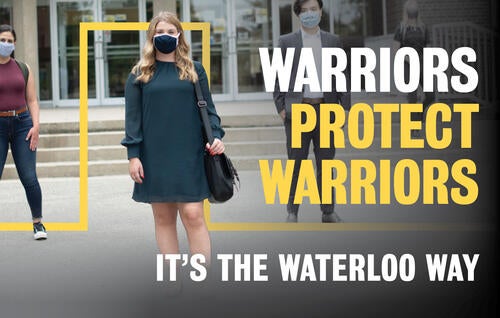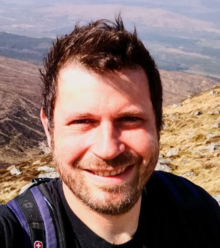The Daily Bulletin is published by Internal and Leadership Communications, part of University Communications
Contact us at bulletin@uwaterloo.ca
Submission guidelines
Editor:
Brandon Sweet
University Communications
bulletin@uwaterloo.ca

A message from Sandra Banks, vice-president, University Relations
Over the last several weeks, we have continued to expand controlled access to the campus for some students and employees. As COVID-19 cases begin to rise again it is as important as ever that all of us in our University community play a part in limiting the spread of the virus, whether we are on campus or not.
We have learned from global public health experts that as the pandemic continues, it is important to move to messaging that reinforces the need to protect the safety of our communities, not just ourselves. Please consider how you can play a role in sharing information and reinforcing safety messaging to our students – and to one another – about ways in which we can protect our community.
To help you, we are sharing some resources that you can use in classes, meetings, in your workspaces, virtual or in person to reinforce safety steps
We will continue to send messages to students on social media and directly by email from central and faculty teams to reinforce the ideas that we are all Waterloo Warriors, and Warriors protect each other.
Please consider using these messages and documents in your own communications. We’re making these resources available for future reference on the COVID-19 website.
A message from Human Rights, Equity and Inclusion.
Waterloo is joining other Canadian universities and colleges across Canada to facilitate national conversations to develop concrete actions for change in higher education and in our communities. The first in the series of these National Dialogues takes place October 1 and 2, 12 noon to 4:00 p.m. and will focus on anti-Black racism and Black inclusion in Canadian higher education.
This year’s Dialogues and Action will focus on sharing experiences and ideas, exploring and learning best practices, and contributing to the formulation and implementation of concrete actions that resolutely reject anti-Black racism and drive meaningful, enduring Black inclusion within individual universities and colleges; the higher education sector, in general; and our communities.
Further to Waterloo’s actions and commitments to address systemic anti-Black racism on our campus, students, faculty members, and staff are encouraged to register at no cost and attend any or all of these sessions. Learn more and register.

A message from Information Systems & Technology.
LinkedIn Learning (LiL, formerly known as Lynda.com) has been in use on campus since approximately 2014. LiL is a web-based service that offers over 130,000 video training courses taught by experts in software, creative, IT, and business skills. At the end of 2016, Microsoft purchased Lynda.com, and in May 2018 the provincial government provided funding to extend access to all students and employees at Ontario colleges and universities. In July 2019, Lynda.com online training moved to LinkedIn Learning and University students and employees were invited to activate or create their new LiL accounts to get started.
The provincially funded LinkedIn Learning (LiL) agreement will not continue beyond the original contract date of September 25, 2020. However, the University of Waterloo has committed to a new three-year agreement with LiL to continue our full access to the content our campus has come to rely upon and benefit from. This stability will allow academic courses and training programs to continue to draw upon and expand use of the resources that come with LiL.
Your current LiL access will remain the same; it will not change as a result of this new agreement. The license continues to be accessible in China, but as before, mobile access is not available. Learners in China can still access LinkedIn Learning via the desktop and mobile web browser.
Some of the benefits of LiL include:
Information about LiL and accessing/creating your account, and an expanded FAQ section, is available at https://uwaterloo.ca/information-systems-technology/services/linkedin-learning.
You are invited to direct related questions to the IST Service Desk, helpdesk@uwaterloo.ca.
 The University of Waterloo has a number of experts available for comment on various aspects of the COVID-19 pandemic, click here to see the up-to-date list.
The University of Waterloo has a number of experts available for comment on various aspects of the COVID-19 pandemic, click here to see the up-to-date list.
As we navigate the COVID-19 pandemic, Waterloo science professor Jozef Nissimov has been working to fight misinformation, and share accurate scientific resources. We asked Professor Nissimov to explain science literacy, and why it is even more important as the world deals with the ongoing COVID-19 pandemic.
What is science literacy?
Science literacy is the ability to critically assess and evaluate scientific information and its credibility without the need to be an expert. A scientifically literate individual should be able to think critically about what they read or hear about, in order to evaluate the information’s source and accuracy. Don’t just repost something, but spend the extra time and find out first if it’s reliable.
Importantly, scientific literacy means that one should understand that science doesn’t always have all the answers. And the answers that science does have at its disposal are subject to the best knowledge and tools that it has at a given moment in time. The beauty of science is that it is flexible and open to new ideas. It is open to be challenged and to shifts in common scientific principles.
Why is it important to promote science literacy?
The importance of scientific literacy is evident now more than ever. We live in times when everyone has access to scientific information. Most of this information is reliable, and credible news agencies usually do a good job of reporting the facts. However, there are also cases when scientific information is reported in a skewed manner, where scientific facts or the result of a study are “cherry-picked” in order to provide a “twist” to a story. This is dangerous and can compromise the credibility of scientists and their discoveries. This is not how science works, and scientific literate individuals should be able to detect such cases of “cherry-picking”.
We live in a digital age, bombarded constantly with breaking news and stories. Many young people receive their news solely via social media and when the news comes from a celebrity (or even an elected public figure) with millions of followers, people are more inclined to listen to them rather than an expert who has had hundreds of peer-reviewed articles, has authored dozens of books, and had attended the best schools. This is exactly when scientific literacy comes at play, because it provides us with the ability to critically evaluate information and to trust expert advice.
How has COVID impacted the public’s perception of science?
I believe that now more than ever, people are looking to science for answers. They want answers, they want information, and they want to know when a vaccine will be ready so that life can get back to normal. I don’t think that there has been a time in history when so many people in the world knew what a virus is.
Having said that, because COVID-19 is caused by a new virus, science still looks for the answers, and the answers we currently have may change as we learn more. Scientific literacy means accepting and understanding this fact.
Scientific literacy varies between countries and within countries. Canadians seem to be more inclined to listen to expert advice and follow COVID-19 related guidelines more than in other countries. A possible reason for this is perhaps the fact that scientists are in the public eye a large amount of the time. We have seen doctors, epidemiologists, and virologists give interviews from their living rooms, bedrooms and even their cars on almost every major news program. This is exactly what scientists with knowledge of this pandemic should be doing. They help as much as they can, and explain to the best of their ability the complicated situation we all find ourselves in.
As we continue to gradually resume on-campus operations, many academic and service buildings have reopened for fall term. You can find a list of which buildings are open and their operating hours on the What’s open on campus page and through the WatSAFE app.
Several administrative buildings remain locked and must be accessed with a key or a fob. Employees must obtain approval from their department/faculty to access buildings on campus.
Help limit the spread of COVID-19 by limiting your time on campus to necessary visits, and by following public health guidance and the University’s safety recommendations. Don’t forget to:
The Department of Music is hosting a Noon Hour Concert, IY IO SO HOT, on Wednesday, September 30 at 12:30 p.m. Exploring sonic possibilities, and afro-futurist cosmologies through improvisation, Clifton Joey Guidry III (bassoon), Lisa E. Harris (voice/theremin), Olivia J. P. Harris (cello), seek the answer to the question, IY IS IO SO HOT? The concert is free to attend and will take place on online. The concert will be released on September 30th and will remain on the Grebel You-tube Channel.
September 28, 1972: Canada defeats USSR in final game of Summit Series
Students can visit the Student Success Office online for supports including academic development, international student resources, leadership development, exchange and study abroad, and opportunities to get involved.
Instructors can visit the Keep Learning website to get support on adapting their teaching and learning plans for an online environment. The following workshops are current offerings from the KL team (CTE, CEL, ITMS, LIB):
Getting Ready to Facilitate Online Courses: TA Training, beginning July 13.
Remote Course Design Essentials, beginning August 26.
Independent Remote Course Design Essentials. Continuous self-enroll course in LEARN.
ATLAS: Part 2, Wednesday, September 30, 2020, 1:00 p.m. to 3:00 p.m.
Thirty Minute Thursdays – PebblePad, Thursday, October 1, 2020, 12:00 p.m. to 12:30 p.m.
Assessment Design Cafe, Tuesday, October 6, 2020 to 9:30 am to 11:00 a.m.
Thirty Minute Thursdays – PebblePad, Thursday, October 8, 2020, 12:00 p.m. to 12:30 p.m.
Employees can access resources to help them work remotely, including managing University records and privacy of personal information.
Interested in learning more about engaging your students in an online course? The Centre for Extended Learning has created a new resource for you called "Fostering Engagement: Facilitating Online Courses in Higher Education"
This Open Educational Resource was designed for post-secondary instructors and teaching assistants who would like to better understand the critical role of facilitation in online course delivery, and build practical skills and strategies that are relevant, effective, and authentic.
Here are some tips for staying healthy while working from home.
The Writing and Communication Centre is rolling out virtual services and programs for fall term:
We understand that these circumstances can be troubling, and you may need to speak with someone for emotional support. Good2Talk is a post-secondary student helpline based in Ontario, Canada that is available to all students. If you feel overwhelmed or anxious and need to talk to somebody, please contact the University’s Campus Wellness services, either Health Services or Counselling Services. You can also contact the University's Centre for Mental Health Research and Treatment.
The Library has published a resource guide on how to avoid information overload.
The Faculty Association of the University of Waterloo (FAUW) continues to advocate for its members. Check out the FAUW blog for more information.
The University of Waterloo Staff Association (UWSA) continues to advocate for its members. Check out the UWSA blog for more information.
WUSA supports for students:
Food Support Service food hampers are currently available from the Turnkey Desk on weekdays from 9:00 a.m. to 4:00 p.m. in the Student Life Centre. If you have any questions please email us at foodsupport@wusa.ca.
The Bike Centre – Now open by appointment for your bicycle repair and rental needs in the Student Life Centre. For more information or to schedule an appointment, please go to: https://wusa.ca/bikecentre
Centre for Academic Policy Support - CAPS is here to assist Waterloo undergraduates throughout their experience in navigating academic policy in the instances of filing petitions, grievances and appeals. Please contact them at caps@wusa.ca. More information at http://wusa.ca/caps
WUSA Commissioners who can help in a variety of areas that students may be experiencing during this time:
WUSA Student Legal Protection Program - Seeking legal counsel can be intimidating, especially if it’s your first time facing a legal issue. The legal assistance helpline provides quick access to legal advice in any area of law, including criminal. Just call 1-833-202-4571.
Empower Me is a confidential mental health and wellness service that connects students with qualified counsellors 24/7. They can be reached at 1-833-628-5589.
Healthy Warriors at Home. Free programming including Online Fitness, Health Webinars, Personalized Nutrition and more from Warriors Athletics and Rec. Open to students, staff, faculty and alumni. Register today.
Renison English Language Institute continues to offer virtual events and workshops to help students practice their English language skills.
Concept $5K & Climate Change Grant Applications Open, Monday September 28.
Portage-Global Water Futures Research Data Management webinar series: “Beginning with the End in Mind,” Tuesday, Sept 29, 1:00 p.m. Register here
QPR Mental Health Training for Students, Wednesday, September 30, 9:30 a.m. Online. Register on GoSignMeUp.
Mastering Low Mood: Learning Skills from CBT for Students, Wednesday, September 30, 10:00 a.m., Online – Register on GoSignMeUp.
Noon Hour Concert: IY IO SO HOT. Exploring sonic possibilities, and afro-futurist cosmologies through improvisation. Wednesday, September 30, 12:30pm, Online. Free admission.
Warriors Athletics and Rec Virtual Open House. Learn about online and in person programs, and what facilities are available. Open to Students, Staff and Faculty.Wednesday, September 30, 1:00 p.m.
Concept Intro Session: Should You Build a Company, Wednesday September 30, 5:00 p.m. Virtual Event.
Water Institute Research Conference 2020: Can we achieve SDG6 in a post COVID-19 world, September 30 to October 1, 8:00 to 9:30 a.m.
Akindi Live Training (Webinar), Thursday, October 1, from 1:00-1:45 p.m.
Grad Student Community and Conversation Circle, Thursday, October 1, 3:30 p.m., Online – Register on GoSignMeUp.
Coping with Flashbacks, a workshop for survivors of sexual assault. October 1, 4:30 p.m.
Concept Graduate Student Startup Fund Applications Open, Monday October 5
Portage-Global Water Futures Research Data Management webinar series: “Enhancing Collaboration and Reproducibility Using GitHub” Tuesday, Oct 6, 1:00 p.m. Registration details are available here.
Concept IP Series: Case Study, Tuesday October 6, 3:00pm, Virtual Event
Portage Research Data Management webinar series: “Data Summaries: Distilling Best Practices” Wednesday, Oct 7, 1:00 p.m. Registration details are available here.
Managing Difficult Conversations Workshop, hosted and facilitated by the Conflict Management & Human Rights Office, Oct 7, 1:00 p.m. to 3:00 p.m.
Concept Intro Session: The Business Model, Wednesday October 7, 5:00pm, Virtual Event
Grad Student Community and Conversation Circle, Thursday, October 8, 3:30 p.m., Online – Register on GoSignMeUp.
Taking Responsibility in the Anti-Racist Movement, hosted by the Equity Office and facilitated by Janice Jo Lee, Oct 8, 1:00 p.m. to 4:00 p.m.
The Daily Bulletin is published by Internal and Leadership Communications, part of University Communications
Contact us at bulletin@uwaterloo.ca
Submission guidelines
The University of Waterloo acknowledges that much of our work takes place on the traditional territory of the Neutral, Anishinaabeg, and Haudenosaunee peoples. Our main campus is situated on the Haldimand Tract, the land granted to the Six Nations that includes six miles on each side of the Grand River. Our active work toward reconciliation takes place across our campuses through research, learning, teaching, and community building, and is co-ordinated within the Office of Indigenous Relations.